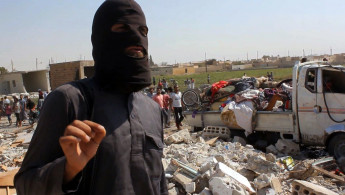Baghdadi speech: a call for mass destruction
The ‘Caliph’ of the so-called Islamic State, Abu Bakar al-Baghdadi, has urged Muslims to join his state or "the battle" wherever they are.
Although the speech was pugnacious, he sought to comfort and reassure his followers by comparing the harsh conditions they face with those encountered by Prophet Mohammed.
The narrative underpinning his reference to the Prophet was in essence directed to three groups of Muslims; the first consists of those who are already fighting with IS in Iraq and Syria.
The message to them meant to comfort those fighting on the frontlines in the two Arab countries. Those fighting in Syria had to retreat in the last few weeks after losing ground and leaders in Syria.
The picture in Iraq is different; IS fighters appear to be maintaining their momentum, and indeed making gains.
His speech attempted to raise the moral of his fighters in Syria and to give more confidence for those fighting in Iraq as they facing Shia militias and the Iraqi army. He recited several verses of the Quran which he claimed supported support this dangerous narrative.
A challenge to Europe
However, the most disturbing part of his speech came in at about eight minutes or so in the recoding released by his propaganda machine on different online media platforms.
In this section, addressed to Muslim communities in the West, he attempted to counter the message of integration by pushing the lie that “living amongst Crusaders and Jews [i.e. the West] is against the principals of Allah and his Prophet.
This is a brazen attempt by jihadists to challenge European governments’ efforts to integrate Muslims in their societies.
To Baghdadi, Islam “was never a religion of peace. Islam is the religion of fighting. No-one should believe that the war that we are waging is the war of the Islamic State. It is the war of all Muslims" he said in the speech.
This reference to Islam not being a peaceful religion looks as if it was aimed at Muslim and community leaders in Western countries whose defence of Islam and what it stands for is often couched in references to its peaceful message and principals.
It shows also that Baghdadi is being advised by European Muslims who ‘migrated’ to his Islamic State.
In essence, he is presenting Muslim communities in the West with two reprehensible options: fight ‘the infidels’ in their own countries, or ‘migrate’ to the caliphate state if you can.
He also seems to have been advised to play on the uncertainty of many Muslims who live in the West, who regard their migration to Europe as a necessity rather than a choice; largely to escape repression and poverty back home.
As a Muslim living in the West and I acknowledge that there is a group of Muslims who say that they are living in Europe only because they had no other choice.
If this attempt by al Baghdadi to play on the emotions of this constituency of Muslims was blatant, then his second message to them was downright murderous: Muslims in Europe who can’t quite make it to his Islamic State should carry out attacks of one sort or another in their adopted countries.
A recruiting sergeant
He stressed though, in case there was any doubt, that such entreaties were not a sign of weakness or reflected a dwindling supply of fighters:
“We are not calling on you because we are short of manpower, but this a call upon you to fulfil your duty of your religion” he told his audience.
This rhetoric gives us a glimpse of the tactics and approaches designed to influence Muslims, especially those who have only rudimentary and often misguided interpretation of religious context.
Baghdadi then turns his mocking attention to Saudi Arabia and the Saudi-led air campaign in Yemen.
Baghdadi was not only saying that he was alive and well contrary to several reports that he was either dead or severely injured, and that he feels confident enough to deliver a half hour speech, but it also tells us that he is aware of what is going on in the West among the Muslim communities.
The role of his Western Muslim advisers is quite evident and shows the importance of the role they are playing in support of the jihadists.
The third group targeted by Baghdadi was the reluctant Sunni Muslims in the Arab world.
He simply compared the life under the ‘Arab oppressors’ and the alleged dignified one in the Islamic state’. For millions of people who suffer poverty and social inequality this speech may play well especially with some young people’s heads and emotions, who take this kind of message atr face value and who may even be induced to join his forces.
A quick comparison of al-Baghdadi’s speech with any of Bin Laden’s, for instance, will show a similar violent and ruthless narrative that targets anyone who is not following their ideology.
Add to this, the misguided and often inaccurate interpretation of Quranic verses which he cites in support of this narrative seem to resonate with some young Muslims.
The fact that his violent group has achieved military successes and took over territories in the region that brought it close to the gates of two great Arab and Muslim capitals, Damascus and Baghdad, add to his and the group’s credibility.
It is his twisted discourse, and these murderous tactics combined with battlefield ‘successes’ that has been a recruiting sergeant for this odious group.
In less than a year, Baghdadi has surpassed what Bin Laden was hoping to achieve for over a decade.
The next couple of years may define the shape and nature of the Arab region; no one yet has an inkling of what this would look like. One thing for certain though, the Arab world and the wider Middle East will be a very different place indeed if this discourse continues to gain traction.



